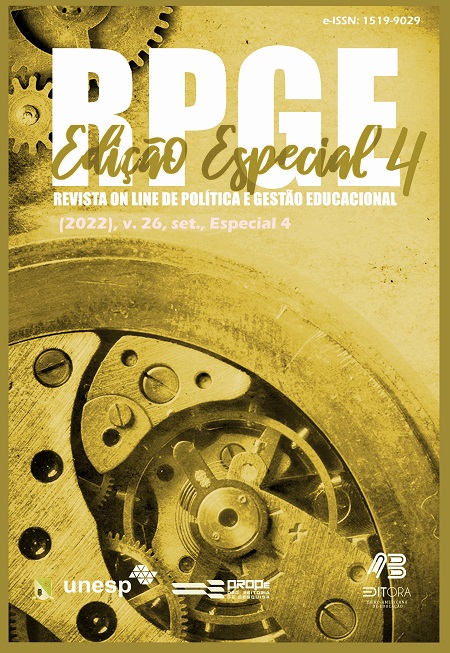The process of social integration of Warao indigenous children and adolescents in the public school in Mossoró-RN
DOI:
https://doi.org/10.22633/rpge.v26iesp.4.17128Keywords:
Warao, Indigenous school education, Guarantee of rights, Social Integration, Mossoró – RNAbstract
This article brings together a set of ethnographic notes and anthropological reflections on the current process of social integration of the Warao in the Public School of Mossoró-RN, aiming to organize the effort of critical apprehension that has been built within the scope of the research The Warao in Mossoró: the migratory dynamics and the urban village process in the Covid-19 pandemic scenario. The dynamics underway since the year 2021 of this winding process that involves the small “foreign” indigenous group and the welcoming local Brazilian society, in a broad sense, has advanced significantly in the current year of 2022. However, bureaucratic obstacles persist on the part of the authorities and, above all, equivocations at a symbolic, moral-emotional and political-ideological level on both sides (the Warao and the surrounding Brazilian society) on how (and if) this Warao integration in the Formal Education of Public Schools should continue, in abstract terms. And, at a concrete and situational level, in a local school unit despite all the well-known regrets in the already precarious and overloaded Brazilian Education. This bureaucratically tense, pedagogically challenging and anthropologically rich process of integration of the Warao in the Public School in Mossoró-RN was problematized in three argumentative moments: the arrival of the Warao in urban Mossoro; the legal diplomas that guarantee the School Education to the Indigenous and to the Migrant; the concrete process of social integration of the Warao at the Padre Alfredo State School.
Downloads
References
ALMEIDA, M. R. C. Os índios aldeados: Histórias e identidades em construção. TEMPO, Rio de Janeiro, n. 12, p. 51-71, 2001. Disponível em: https://www.redalyc.org/articulo.oa?id=167018164003. Acesso em: 22 mar. 2021.
OIM. AGÊNCIA DAS NAÇÕES UNIDAS PARA AS MIGRAÇÕES. Aspectos jurídicos da atenção aos indígenas migrantes da Venezuela para o Brasil. 2018.
BOTELHO, E.; RAMOS, L.; TARRAGÓ, E. Parecer Técnico n. 208/2017/SEAP/6ªCCR/PFDC. Brasília, DF: Ministério Público Federal, 2017.
CIRINO, C. A. M. Indígenas, imigrantes e refugiados: Os Warao e a proteção jurídica do Estado brasileiro. EntreRios - Revista do PPGANT/UFPI, v. 3, n. 2, p. 124-136, 2020. Disponível em: https://revistas.ufpi.br/index.php/entrerios/article/view/11028. Acesso em: 06 jan. 2021.
DAMATTA, R. O que faz o Brasil, Brasil? Rio de Janeiro: Rocco, 1986.
ESTORNIOLO, M. Laboratório na floresta: Os Baniwa, os peixes e a piscicultura no alto rio Negro. Brasília, DF: Paralelo 15, 2014.
HABERMAS, J. Teoria do Agir Comunicativo. São Paulo: Editora WMF Martins Fontes, 2012.
INGOLD, T. Antropologia: Para que serve? Petrópolis, RJ: Editoras Vozes, 2019.
LIMA, C. L. S. Interculturalidade e os desafios da inclusão dos Warao. EntreRios - Revista do PPGANT/UFPI, Teresina, v. 3, n. 2, p. 137-152, 2020. Disponível em: https://revistas.ufpi.br/index.php/entrerios/article/view/12036/6966. Acesso em: 15 maio 2021.
LUTZ, C. Emotion, Thought, and Estrangement: Emotion as a Cultural Category. Cultural Anthropology, v.1, n. 3, p. 287-309, 1986. Disponível em: https://www.jstor.org/stable/656193. Acesso em: 20 out. 2020.
MUÑOZ, J. G. G. La Oralidad como Instrumento Esencial para la Reconstrucción de la Memoria Etnohistórica del Pueblo Warao. 2009. Tesis (Doctorado en Cultura y Arte) – América Latina y El Caribe aprobada en nombre de la Universidad Pedagógica Experimental Libertador por el siguiente Jurado, 2009.
MUÑOZ, J. G. G. Etnia indígena Warao: Visibilidad de los prejuicios occidentales contemporáneos hacia la ancestralidad. Revista Serviço Social & Saúde, Campinas, v. 18, p. 1-27, 2019. Disponível em: https://periodicos.sbu.unicamp.br/ojs/index.php/sss/article/view/8656931. Acesso em: 15 mar. 2021.
SANTOS, M.; SONEGHETTI, P. M. C.; TARRAGÓ, E. Parecer Técnico n. 328/2018 – DPA/SPPEA/PGR. Brasília, DF: Ministério Público Federal, 2018.
SILVA, E. A.; BARBOSA, R. B. Os Warao em Mossoró: Notas etnográficas dos primeiros contatos e estranhamentos. Revista Turismo Estudos e Práticas, GEPLAT: Caderno Suplementar, n. 5, p. 1-9, dez. 2020. Disponível em: https://geplat.com/rtep/index.php/tourism/article/view/850/811. Acesso em: 12 mar. 2021.
SILVA, E. A.; BARBOSA, R. B. Os Warao em Mossoró: A dinâmica migratória e o processo de aldeamento urbano no cenário pandêmico da Covid-19. 2021.
VIVEIROS DE CASTRO, E. Perspectival Anthropology and the Method of Controlled Equivocation. Tipití: Journal of the Society for the Anthropology of Lowland South America, v. 2, n. 1, p. 3-22, 2004. Disponível em: https://www.unil.ch/stslab/files/live/sites/stslab/files/Actu/Perspectival%20Anthropology%20and%20the%20Method%20of%20Controlled%20Equivocati.pdf. Acesso em: 12 jun. 2021.
Published
How to Cite
Issue
Section
License
Copyright (c) 2022 Revista on line de Política e Gestão Educacional

This work is licensed under a Creative Commons Attribution-NonCommercial-ShareAlike 4.0 International License.
Manuscritos aceitos e publicados são de propriedade da Revista on line de Política e Gestão Educacional. É vedada a submissão integral ou parcial do manuscrito a qualquer outro periódico. A responsabilidade do conteúdo dos artigos é exclusiva dos autores. É vedada a tradução para outro idioma sem a autorização escrita do Editor ouvida a Comissão Editorial Científica.











